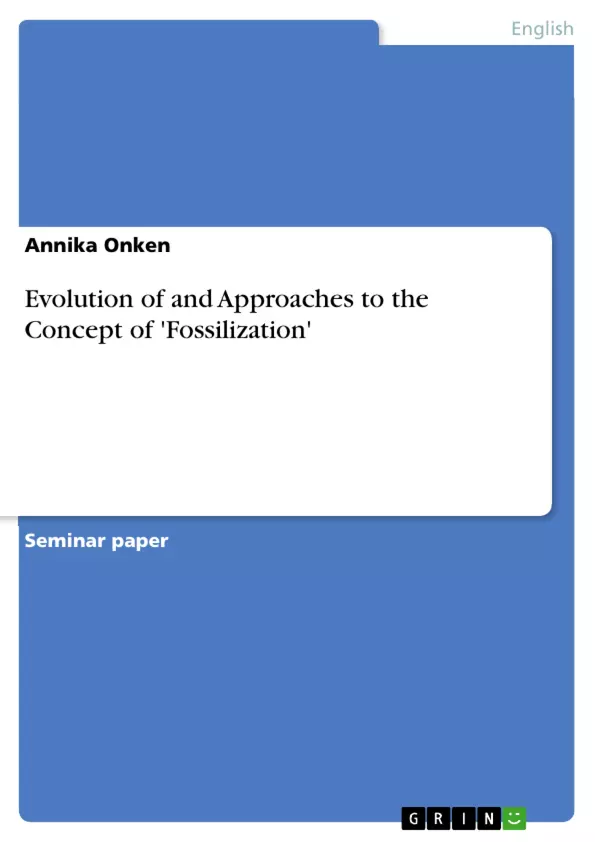Fossilization is commonly described in SLA literature as a “phenomenon of non-progression of learning despite continuous exposure to input, adequate motivation to learn, and sufficient opportunity for practice” (Han 13). The Question behind this notion is: Are adults able to ever acquire native-like competence in an L2? And if some learners are, what does this mean with respect to a majority of learners who seem not to be (cf. Han 13)? This bifurcation of possible outcomes in learning a second language is mirrored in the large variety of terms used to describe the concept of ‘fossilization’. Among others, it is described “as ‘virtual halt’, ‘linguistic monstrosities’, ‘plateau’, ‘rigor mortis’, ‘stopping short’, ‘fossilized variation’, ‘permanent optionality’, ‘siesta’ [and] ‘endstate’”(Han 13 - 14). Such a range of labels reveals differing conceptual ideas about the topic’s nature concerning its powers of spread within the learner’s interlanguage, its finitude, reoccurring continuation and inevitableness. The terms ‘linguistic monstrosities’ and ‘fossilized variation’ rather hint at only parts of the interlanguage being affected by fossilization as opposed to the notion of a completely ‘fossilized interlanguage’. The term ‘virtual halt’ supports this idea that while some aspects seem to be fossilized others might continue to develop. Whereas the terms ‘rigor mortis’ and ‘endstate’ convey an understanding of fossilization’s lethal and final everlastingness prohibiting any further linguistic development whatsoever, the terms ‘siesta’, ‘plateau’ and ‘permanent optionality’ ,on the other hand, consider the concept to be negotiable in some sense holding an option of resuming linguistic development.
In this paper I will very briefly outline some of the major stopping points in the more than three-decade evolution of the concept ‘fossilization’ and illustrate key conceptional issues. Relating to these difficulties I will look at recent voices who express the need for more comprehensive empirical research and rethinking of hitherto approaches and convictions. In doing so, the focus will also be on fossilization in relation to second language instruction.
Table of Contents
- Introduction
- Evolution of the Concept 'Fossilization' and Key Conceptional Issues Surrounding It
- Definitions by Selinker
- What Do Others Think?
- Key Issues and an Alternative Definition by Han (2004)
- Global or Local Fossilization?
- Fossilization as Product or Process?
- Empirical Research
- Definition by Han
- Fossilization and Second Language Instruction
Objectives and Key Themes
This paper aims to provide a brief overview of the evolution of the concept of fossilization in second language acquisition (SLA) literature, highlighting key conceptual issues and exploring different perspectives on the phenomenon. It specifically examines the debate surrounding fossilization as a product or process, its global or local nature, and its implications for second language instruction.
- Evolution of the concept of fossilization in SLA literature
- Key conceptual issues surrounding fossilization, including its definition and application
- Different perspectives on fossilization as a product or process, global or local phenomenon
- The implications of fossilization for second language instruction
- The debate about whether adults can achieve native-like competence in a second language
Chapter Summaries
The first chapter introduces the concept of fossilization in SLA literature, defining it as a phenomenon where learning stagnates despite exposure to input, motivation, and practice. It raises the question of whether adults can achieve native-like competence in a second language and explores the various terms used to describe fossilization, highlighting differing conceptual ideas about its nature and potential for development.
The second chapter delves into the evolution of the concept of 'fossilization' and its key conceptual issues. It begins by examining Selinker's initial 1972 definition, which presents fossilization as a combination of a cognitive mechanism and a performance-related structural notion. It then explores subsequent developments, including the shift from local to global fossilization, the debate on fossilization as a product or process, and the need for empirical research.
Keywords
The main keywords and focus topics of this paper include fossilization, second language acquisition (SLA), interlanguage, native-like competence, cognitive mechanism, performance-related structure, global fossilization, local fossilization, empirical research, and second language instruction.
Frequently Asked Questions
What is 'fossilization' in second language acquisition?
Fossilization is the phenomenon where a learner's progress in a second language stops despite continuous exposure, motivation, and practice. It results in linguistic errors that become permanent.
Can adults achieve native-like competence in a second language?
This is a central question in SLA research. While some adults do, the majority seem to reach a plateau or "endstate" that falls short of native proficiency, leading to the concept of fossilization.
What is the difference between global and local fossilization?
Global fossilization suggests the entire interlanguage system stops developing, while local fossilization refers to specific linguistic features (like grammar or pronunciation) that stop progressing while others may continue.
Is fossilization a product or a process?
The paper discusses this debate: some see it as the final state (product) of learning, while others, like Han, view it as a cognitive process of selective stabilization of certain linguistic forms.
What are some common terms used to describe fossilization?
Literature uses various colorful labels such as "rigor mortis," "linguistic monstrosities," "plateau," "siesta," and "permanent optionality," reflecting different views on its permanence.
How does fossilization affect second language instruction?
The concept challenges teachers to find ways to "defossilize" learner language and raises questions about the effectiveness of continuous instruction once certain errors have stabilized.
- Quote paper
- Annika Onken (Author), 2010, Evolution of and Approaches to the Concept of 'Fossilization', Munich, GRIN Verlag, https://www.grin.com/document/187862



